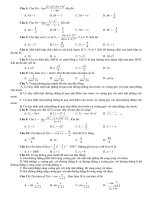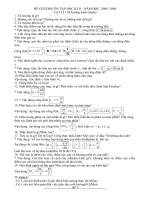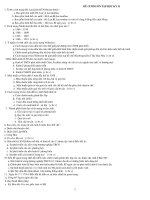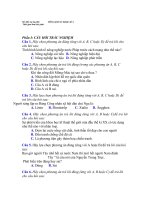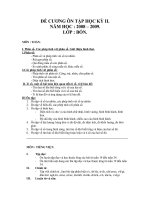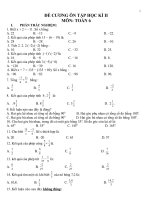DE CUONG ON TAP HKII (08-09).doc
Bạn đang xem bản rút gọn của tài liệu. Xem và tải ngay bản đầy đủ của tài liệu tại đây (115.33 KB, 5 trang )
REVIEW - ĐỀ CƯƠNG ƠN TẬP AV K 8
A. THEORY
1. Present Simple tense )
- Form: + S + V/V
s / es
+ …………………… Ex -The earth goes around the sun.
- S + don’t/doesn’t + V+ ……………….. -We don’t have classes on Sunday.
? Do/Does + S + V + ………………….? - Does Lan speak French?
2. Past Simple Tense (Thì quá khứ đơn)
- Use : Diễn tả hành động xảy ra và kết thúc tại một thời điểm xác đònh ở quá khứ
- Form: + S + V
-ed(regular)
/ V
2 ( column irregular)
+ ………… Ex : - He arrived here yesterday.
- S + didn’t + V + …………………. - She didn’t go to school yesterday.
? Did + S + V + …………………… ? - Did you clean this table?
- Note: Thì quá khứ đơn thường được dùng với các từ chỉ thời gian xác đònh ù: yesterday; ago;
last.
3. Future simple Tense ( Thì tương lai đơn)
- Form : + S + will / shall + V + …………… Ex: He will finish his homework tomorrow.
- S+ won’t / shan’t + V + ……………….. - Lan won’t go to the zoo next week.
? Will / Shall + S + V + …………………. ? - Will you do this exercise ?
- Note: Thì tương lai thường được dùng với các từ chỉ thời gian xác đònh : tomorrow, tonight, soon
,next….
4. Present progressive Tense ( Thì hiện tại tiếp diễn )
- Use : Diễn tả một hành động xảy ra vào đúng thời điểm nói.
-Form : + S + is / am/ are + V
-ing
+ …………… Ex : I’m learning English now.
- S + is / am/ are + not + V
-ing
+ …… He isn’t learning English now.
? Is / Am / Are + S + V
-ing
+ ………? Is he reading books now?
- Note: Thì hiện tại tiếp diễn thường dùng kèm với các trạng từ : now, right now,at present , at
the moment.
5. Past progressive Tense ( Thì quá khứ tiếp diễn )
-Form: + S + was / were + V-ing
_ S + was / were not + V-ing
? Was / Were + S + V-ing ?
* Note: When, while
6. Present perfect tense: Thì hiện tại hòan thành:
Form: + S + have / has + V
3/ed
- S + have / has + V
3/ed
? Have / Has + S + V
3/ ed
?
- Note: Thì HTHT thường được dùng với các từ : since, for, never, aver, already, recently, just,
yet.
7. The passive form (voice)
Form: BE + V
3
/V-ed (past participle)
Modals verbs + be + V
3/ed
Have / has + been + V
3/ed
Ex: She clean her house every day => Her house is cleaned by her every day.
We have learned English for 3 years. => English has learned by us for 3 years.
They will visit Ha Long bay next summer. => Ha Long Bay will be visited next summer.
8. Reported speech ( lời nói trần thuật) là câu thuật lại một cách gián tiếp lời nói
của người khác. Để chuyển từ trực tiếp sang câu gián tiếp chúng ta phải:
Ex: Direct speech: “I’ll talk to Hoa.”said he. → He said he would talk to Hoa
- Nếu động từ tường thuật ở thì hiện tại thì thì của động từ chính được giữ nguyên khi chuyển lời
nói trực tiếp sang gián tiếp.Trạng từ chỉ nơi chốn,thời gian và đại từ chỉ đònh được giữ nguyên.
Ex: Direct speech : “I’m arriving at about 6.00.”says Brenda.
Reported speech : Brenda says she’s arriving at about 6.00.
Note: - Có thể dùng hoặc không dùng “that” sau động từ tường thuật.
Ví dụ : He said (that) he wasn’t going.
- says / say to + O → tells / tell = O said to + O → told + O
Exï : He told (said to) Helen (that) he didn’t like coffee.
- Một số động từ không thay đổi khi chuyển sang lời nói gián tiếp.
Would → would, could → could, might → might, should → should, ought to → ought to
- Yes – No questions :
ta dùng “if” hay “whether” trong lời nói trần thuật và theo sau các động từ mở đầu .
Ex: “ Do you see new friend?” he said → He asked if you saw new friends.
- Wh –questions : Thường được bắt đầu bằng các động từ “ask, wonder,want to know . . .”và
theo sau là các nghi vấn từ : who,which,whom,what,. . .
Ex: “ Who is going for a walk?” he asked them. → He asked them who was going for a walk.
9. Some patterns:
a. Requests with: Would / Do you mind if ……………..?
Would / Do you mind _ V-ing ?
b. in order (not) to / so as (not) to: Để mà
Ex: We have learned hard in order to/ so as to pass the examination
c. Compound words: rice-cooking; fire-making
d. –ed and –ing participles:
Ex: The boy reading book is Ba
The old lamp made in China is five dollars.
B. EXERCISES
I. Choose the word that has the underlined part pronounced differently fro the others.
1. A. carve B. warm C. farm D. depart
2. A. empire B. while C. liberty D. sightseeing
3. A. busy B. humid C. museum D. music
4. A. pour B. sound C. mount D. cloudy
5. A. pick B. ticket C. rock D. vacation
6.A. festival B. man C. fat D. grand
7. A. carol B. export C. patron D. custom
8. A. upset B. custom C. return D. unsuitable
9. A. saint B. tailor C. explain D. said
10. A. beach B. catch C. church D. Christmas
II. Choose the best answer ( A, B, or C ):
1. We can’t decide ………………… to apply this program or not .
A, whether B, where C, how
2. Nam wants to return to the village……………… he was born.
A, where B, when C. what
3. Lan had her brother ………………….. her bike.
A, fix B, fixing C, to fix
4. “ Do you know where ……………..?” “ No, he didn’t say .”
A. Tom has gone B, did Tom go C, Tom went
5. Life in the country is different …………… life in the city.
A, with B, to C, from
6. I must go now. I promise …………… late.
A, not being B, not to be C, to not be
7. Do they know how……………………… computers ?
A, to use B, using C, use
8. This house ………………….. built by my grandfather in 1990.
A, were B, is C, was
9. My sister …………….. me she didn’t know what to do .
A, said B, told C, asked
10. They don’t know how to ………………… the games.
A, playing B, play C, played
11. I thanked my classmate ………………. helping me with my homework.
A, of B, about C, for
12. A contest in which participants have to fetch water contest from the rice called ………..
A, water-fetch contest B, water-fetching contest C, fetching-water contest
13. Huy said he …………………… a chocolates factory then .
A. have visited B, visited C, has visited
14. Our teacher asked us……………… we liked to go camping in the coming festival .
A, if B, what C, whether if
15. The bill………………. to you at the end of the month.
A, will send B, will be sent C, will be send
16. I’d like to borrow this book. Has Ann read it …………………?
A, for B, already C, yet
17. Would you …………….. helping me with the washing ?
A, like B, mind C, show
18. Children should………… to respect their elders.
A, be teach B, be taught C, be teached
19. Would you mind if I………. the window?
A, closing B, closed C, to close
20. We have ordered a taxi to pick us……………… at ten.
A, up B. on C, over
21. He wants…………… where to get a map of the city.
A, to knowing B, to know C, know
22. I’ll go and thank him …………….. offering to help.
A, about B, of C, for
23.Do you mind …………… a little more slowly? I didn’t catch what you said.
A, to speak B, speaking C, speak
24.We ………………… the dishwasher for three years.
A, have B, have has C, have had
25. That test is …………………. tomorrow.
A, is going done B, going to be done C, is going to be done
III. Choose the word ( A, B, or C) that the best fits each of the blank spaces.
The Nile ( 27) in a stream which flows (28 )………… Ruanda into Lake Vitoria. (28)……….. it leaves
Lake Vitoria, the river is known (29)…………. the White Nile and flows through the Sudan. (30)……….
North it becomes the Nile and (31)…….. through Egypt past Cairo into the Mediterranean Sea,
26. A, begins B, swims C, flows
27. A, since B, from C , on
28. A, When B, While C , However
29. A, like B, so C, as
30. A, Father B, Further C , A & B
31. A, flow B, flows C, flowing
IV. III. Read the following passage and choose the best answer ( A, B, C or D ).
My name is Julia. I’m fifteen years old and I live in Winchester. It isn’t a large town,
and the streets are very narrow. Lots of people come into the town everyday for work and for
shopping. Most of them come by car. The traffic is very noisy and there’s a lot of air pollution.
Sometimes it is hard to breathe. Often , there are traffic jams.
Some of my friends think we should build more roads. Others think we should ban cars from the
center of Winchester. Others think people should travel by bus. I think people should use bicycles
or walk.
32. How old is Julia?
A. 13 B. 14 C. 15 D. 16
33. Winchester………………………
A. is the large town B. has very narrow streets
C. is an old town D. A & B are correct
34. The word ‘ them ’ in line 3 refers to…………………
A. towns B. streets C. people D. cars
35. The word ‘hard’ in line 3 has the same meaning as the word……
A. ‘easy’ B. ‘difficult’ C. ‘dangerous’ D. ‘convenient’
36.Which is the following is not true?
A. Some of the author’s friends think they should build more roads.
B. The author thinks people should use bicycles or walk.
C. There’s no air pollution in Winchester.
D. Many people come into the town every day.
DAP AN
I.
1b; 2c ; 3a ; 4a ; 5d ; 6a ; 7b ; 8c ; 9d ; 10d
II.
1c ; 2a; 3a ; 4c ; 5c ; 6b ; 7a ; 8c ; 9b ; 10b ; 11c ; 12b ; 13b ; 14a ; 15b ; 16c ; 17b ; 18b ;
19b ; 20a ; 21b ; 22c ; 23b ; 24c ; 25b.\
III.
26A ; 27B, 28A, 29C, 30C, 31B
IV.
32C; 33B;34 C; 35B; 36C

